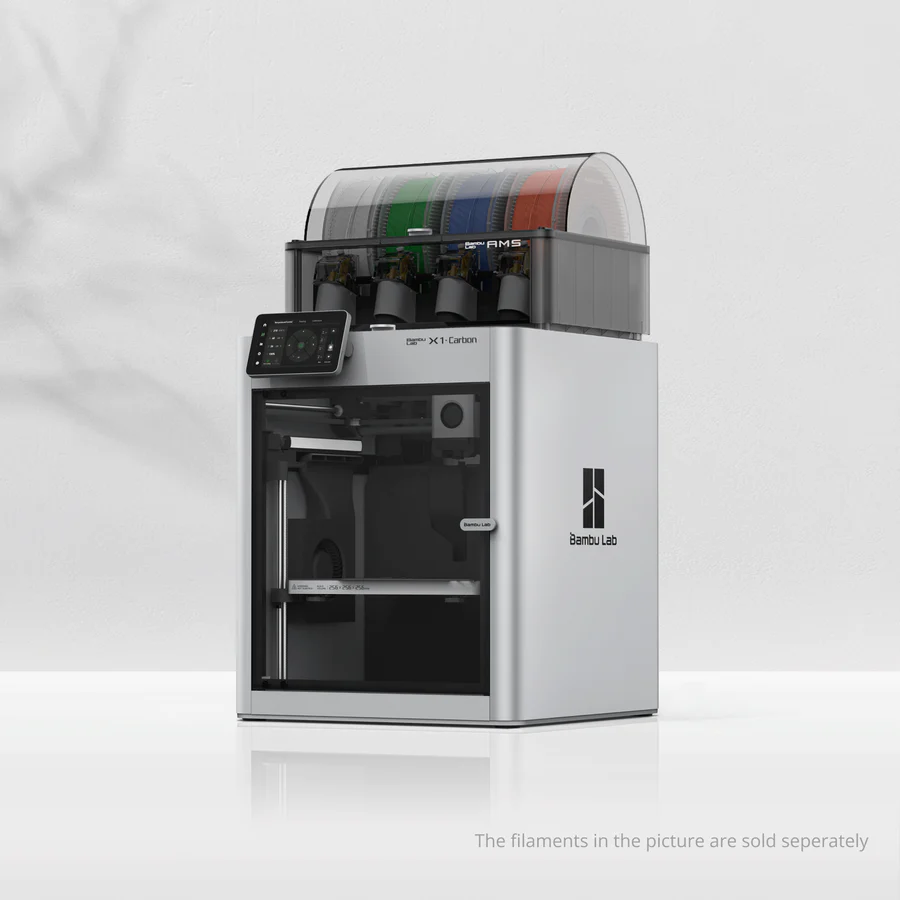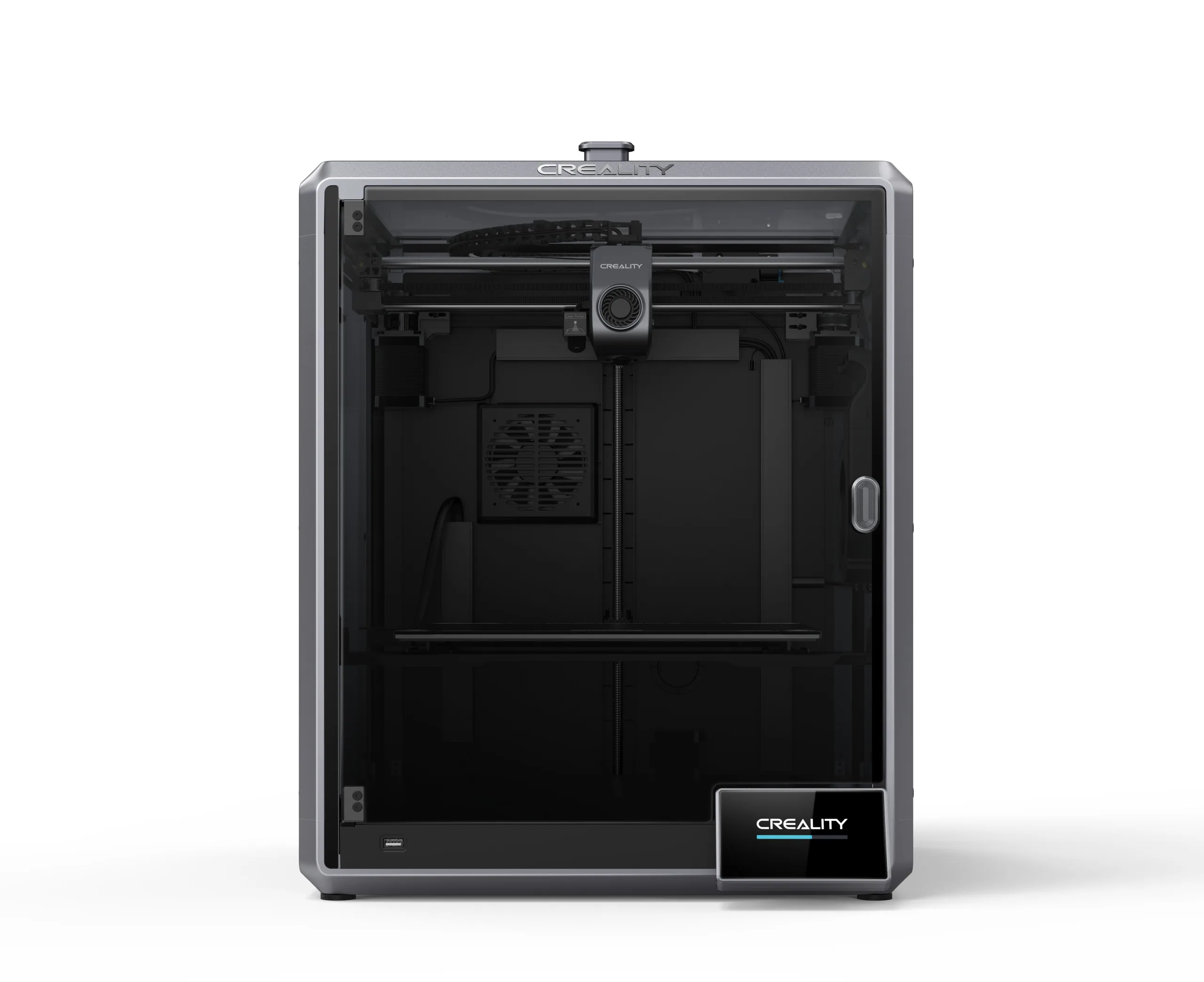Compare X1 carbon vs K1 Max
Comparison between the best 3D printers
Choose the best 3D printer at the best price. The cheapest 3D printers are here.
Buy a 3D printer here with 3D Fila.
 |
 |
|
| Model | X1 carbon |
K1 Max[BUY K1 Max] |
| Printing Material | Filament | Filament |
| Buy Filament for Bambu Lab X1 carbon | Buy Filament forCreality 3D K1 Max | |
| Estimated price | $1449,00 | $1300,00 |
| Manufacturer | Bambu Lab | Creality 3D |
| Release Year | 2023 | 2023 |
| Print Volume [mm] | 256x256x256 | 300x300x300 |
| Printer Size [mm] | 389x389x457 | 435x462x526 |
| Weight [kg] | 14,13 | 18 |
| Power Loss Recovery | YES | YES |
| Enclosed printer | YES | YES |
| Bed Leveling | Automatic | Automatic |
| Filament End Sensor | YES | YES |
| Bed type | Heated | Heated |
| Power supply system | Direct Drive | Direct Drive |
| Standard nozzle | 0,4 | 0,4 |
| Maximum Nozzle Temperature [°C] | 300 | 300 |
| Maximum Bed Temperature [°C] | 120 | 100 |
| Maximum printing speed [mm/s] | 500 | 600 |
| Filament holder | YES | YES |
| Camera for supervision | YES | YES |
| Recommended filaments | PLA, PETG, TPU, PVA, PA, PA-CF, Nylon, PC | ABS, PLA, PETG, TPU, PA, ASA, PC, PLA-CF, PA-CF, PET-CF |
| Recommended slicers | Bambu Studio, Super Slicer, Cura, Prusa Slicer, Orca | Creality Print, Cura, Simplify, Slic3r, IdeaMaker e outros |
| Maximum Resolution [mm] | 0,1 | 0,1 |
| Processor | Quad ARM A7 1.2 GHz | |
| Display | Touchscreen 5'' | Display touchscreen 4,3'' |
| Power Supply | 350 W | |
| Connectivity | Wifi, Bambu bus, Cartão SD | USB / Wi-Fi / Ethernet |
| Operating systems | Windows, Linux, Macbook | Windows, Mac, Linux |
| Date of registration in the system | 2024-04-10 | 2023-12-01 |
| Release date | 2023 | 2023 |
| Extra features | The Bambu Lab X1 Carbon revolutionizes 3D printing with stunning design, high print speeds, and a streamlined user experience. It stands out with its CoreXY system, a hotend capable of reaching 300°C, allowing for a wide range of filaments. Its LiDAR-assisted bed leveling system, vibration compensation, and AMS multicolor printing capability raise the industry standard. Print quality is impressive, with the ability to fine-tune for perfection. The X1 Carbon, with its closed build volume, not only promises but also delivers one of the most advanced 3D printing experiences available to consumers. | The Creality K1 Max stands out as a fast Core XY 3D printer with a large build volume of 300 x 300 x 300 mm. It is fully enclosed and equipped with AI sensors to prevent print failures. This model has a smooth and flexible PEI build platform, and uses an automatic leveling system with LIDAR, as well as a filament run-out sensor. LAN, Creality Cloud and USB Flash Disk connectivity are available, as well as a 4.3-inch touchscreen interface. The K1 Max is robust, weighing in at 18 kg, and includes an AI camera and limited version of the Klipper firmware. Its motion system is solid and the printer is efficient with high-temperature filaments, but it is not silent. Assembly is 99% complete, requiring only minor adjustments before use. |
| Support for multiple colors and materials (AMS and CFS) | YES | NO |
Notes * |
||
| Cost-benefit | 7 / 10 | 7 / 10 |
| Hardware | 6.4 / 10 | 4.8 / 10 |
| Tela | . | . |
| Print volume | 4 / 10 | 4 / 10 |
| Performance | 4 / 10 | 5 / 10 |
| [BUY K1 Max] |
Conclusion |
| When comparing the Bambu Lab X1 Carbon and the Creality K1 Max, both 3D printers showcase advanced technology and impressive features, making them strong contenders in the market. However, they cater to slightly different user needs and preferences. The X1 Carbon leads with its high-end features, such as a superior motion system and innovative LiDAR-assisted bed leveling. This printer is designed for users who demand high print quality and versatility, supporting a wide range of filaments and offering features like AMS for multicolor printing. Its sleek design and reputation for delivering exceptional results make it a compelling choice for enthusiasts and professionals alike. On the other hand, the K1 Max offers a larger print volume, making it ideal for projects requiring greater dimensions. It boasts a robust build and is equipped with AI sensors that enhance reliability and minimize print failures. While it may lack some of the advanced features offered by the X1 Carbon, the K1 Max provides excellent performance, speed, and versatility in materials, appealing to users who need a reliable workhorse for various printing tasks. In terms of cost, the K1 Max presents a better value proposition with a lower price point, making it more accessible to hobbyists and budget-conscious users. Despite being less feature-rich than the X1 Carbon, its sturdy construction and larger print area may offer an attractive option for those prioritizing scalability in their projects. Overall, the choice between the Bambu Lab X1 Carbon and Creality K1 Max boils down to individual needs. For those looking for cutting-edge technology, exceptional print quality, and advanced features, the X1 Carbon is the way to go. Conversely, users in need of larger build dimensions and solid performance at a better price should consider the K1 Max. |

